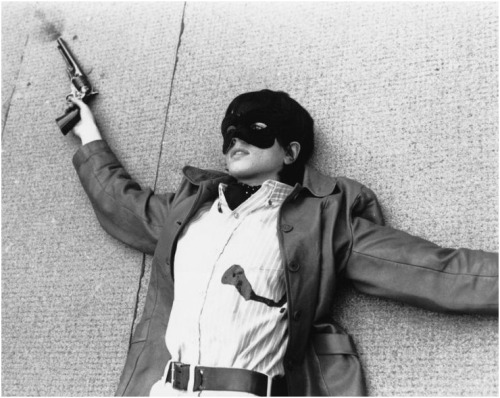Jacques Rivette's Out 1 (1971) was lent its name because it was too immense an undertaking to have a more specific one. Rivette didn't want us to think one thread or theme in the teeming flow of ideas, plots and counterplots is more important than any other, so he gave it something more along the lines of codename for a military operation* than the name of a film. But the name seems not entirely arbitrary. In 1, for instance, wouldn't have the same resonance, though the characters' attempts to find a way Out, to puncture through the veil of banal reality Into a magical world of conspiracy and all-connectedness, only leave them trapped further Inside their little solipsistic bubbles. While that occurs In the fiction, the film that contains the fiction is another matter. The dreams of the characters fizzle and implode, while the dream In which they're figured expands ever Outward. The final shot of the film, returning to a character abandoned hours earlier, right where it left her, at once completes the structure** of the final episode In completely unexpected fashion, and suggests that the film could keep going Indefinitely, taking any number of directions. There are sequences In Out 1 that are so claustrophobic as to feel purgatorial, but its last several seconds open Out to embrace everything.
********
The film scholar Sally Shafto, in her introduction to the film, has another take on the meaning of the title: "The first half plays off of the popular American adjective in the late 60s and early 70s: 'in.' If something was 'in,' it was hip, cool, or groovy, to use other qualifiers of that time. Rivette intuitively and lucidly sensed that his film, originally done for French television, would exceed all norms and indeed the film was rejected by the ORTF."
********
While one of the points I was attempting (in cheeky fashion) to make in the second post in this series was how the film's revolutionary potential has been limited by its lack of distribution, it's also fitting that the film has been so elusive for the past 42 years, in that it has put cinephiles on Rivette's wavelength (raises hand) in the same position as the film's characters, longing and searching for our own way out, which in this case constitutes an escape from the viewing practices and expectations that commercial cinema imposes upon us. What is miraculous about the film is that it largely manages to live up to our dream of it, and delivers a satisfaction that eludes its characters.That said, once the glow of the film has faded (to the extent that it ever does), we're left in a curious place. Once we've been out, there are few places to go but back in, back to the way most movies have been doing it for a century. Even Rivette never went quite this far out on a limb again. Many of his subsequent films are uncommercial in their demands on one's time and intellect (Duelle (1976) and Noroit (1976) are more esoteric, the latter so much so that it was denied theatrical distribution), but they all restore one or two of the supports that he kicks away in Out 1. As for us, do we spend our days pining away for our next chance to enter the labyrinth? Do we let our Out 1 experience color our viewing of Sharknado (2013)? Do we try to grapple with and unpack our experience of it, on a blog, say? All of the above?
The position in which Out 1's viewers find themselves after the film's conclusion parallels the position of the bohemian left in France after May '68--the film's never explicitly stated but obvious context--or, more broadly, the position of the counterculture in the aftermath of the upheavals of the '60s, or, yet more broadly, the aftermath of any promising-but-failed movement against the status quo, from the Paris Commune to Occupy.*** Having glimpsed another way, where do we go from here?
********
As for the "1," I think it's a clear message to every other filmmaker. Now that Out 1 is on DVD in reasonably good quality, is it naive of me to hope a few of them will heed it?
********
But then another part of me, the part that really feels for the plight of Colin (Jean-Pierre Leaud), wants to believe that "Out 1" is actually a very obscure term used in film production, whose meaning only a handful of filmmakers have ever known, and which, if discovered, will explain to us what Rivette was truly getting at here. But if Rivette hasn't forgotten it by now, he'll never tell it. His love of mystery is too strong. He'll happily take the secret to his grave.
**The titles of the film's 8 episodes each draw a connection between two of the characters: "From Lili to Thomas," "From Sarah to Colin," and so on. In some, the connection being drawn is straightforward, in others it's more obscure.
***The film is by no means politically didactic, but if anything it's more politically radical than the more overtly political films Godard was making around the same time, because it doesn't talk about its politics, but puts them into action. It was truly a communal effort, with the actors developing their own characters and dialogue. And the space it creates for viewers is something like the spectatorial equivalent of a Situationist dérive. Claire Denis, who, in addition to being one of our finest living filmmakers and the director of a very fine documentary on Rivette, was present both on set and at the first screening of Out 1, says of it: "Everything was political then. Making the film was political. So was watching it."


No comments:
Post a Comment